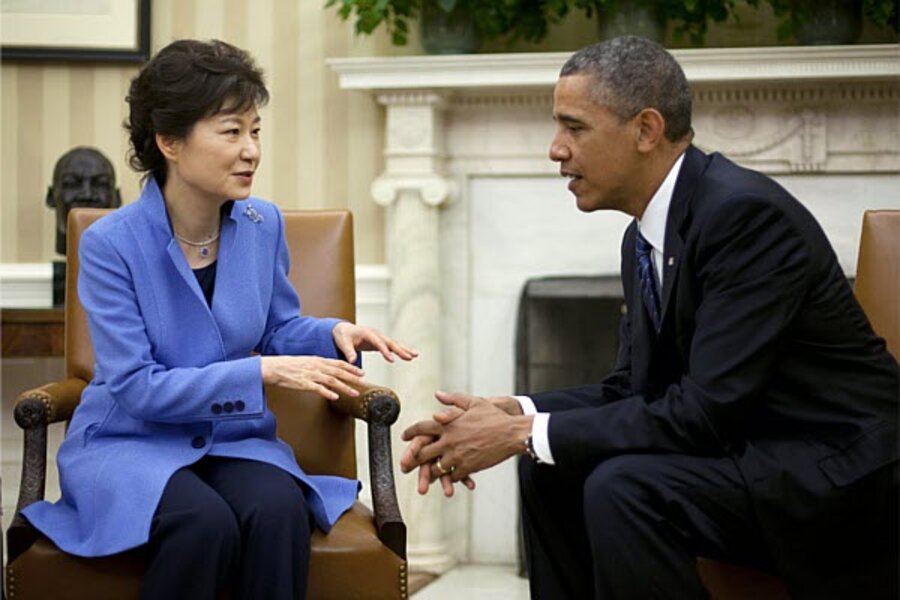US, South Korea put up a tough front, but it doesn't close door to North
Loading...
| Washington
North Korea is in a “provocation pause,” the Pentagon said Tuesday, but that is not stopping the United States and South Korea from displaying a united front toward the North’s belligerence and growing nuclear threat.
It just may be, however, that the goal of the tough unity – on display at the White House Tuesday as President Obama greeted South Korean President Park Geun-hye – is to pave the way to renewed dialogue between the two Koreas at some point down the road.
At a White House press conference Mr. Obama said Pyongyang had “failed again” with its recent nuclear provocations to split the US and South Korea – two countries celebrating 60 years of alliance with President Park’s visit – and that the North can no longer scare the region and the world into bowing to its demands.
“The days when North Korea could create a crisis and elicit concessions, those days are over,” Obama said.
For her part, Park set the tone for the first foreign trip of her presidency with pre-departure vows of swift and more-than-commensurate military response to any North Korean attack.
But Park, who took office in February just two weeks after the North’s third nuclear test, has also made it clear that she sees her toughness as part of a “trust politik” that would allow for renewed dialogue with the North.
Yet a key ingredient of her approach toward the North is her ability to demonstrate a solid US-South Korea alliance, regional experts say – a factor that explains the tone of the Park-Obama summit Tuesday.
Part of Park’s “trust politik” is also to convince the US it can trust her to reengage with Pyongyang when (and if) the opportunity arises.
“What this summit is really about is building a relationship,” says Victor Cha, a former director for Asian affairs on the National Security Council and now the Korea chair at the Center for Strategic and International Studies (CSIS) in Washington.
Even before Park arrived, the White House set out to underscore to North Korea and the world that the two allies stand united in their approach to the North’s provocations.
“In dealing with North Korea, it’s vital we show unity,” Obama’s senior director for Asian affairs, Daniel Russel, said Monday. He said it remains too early to tell if Pyongyang really is pulling back on its provocative actions or is simply “zigzagging.”
He said the US and South Korea agree on a policy of “incremental engagement” with North Korea, but it’s one that can only advance if the North undertakes concrete and permanent steps to dismantle its nuclear program.
The hard part for the US and South Korea won’t be in the outward display of unity, some regional experts say. The “tougher discussion behind the scenes” will be how to balance the dual-track approach to North Korea of keeping up the pressure “coupled with maintaining an opening for dialogue,” says Michael Green, a former senior director for Asia on the National Security Council and now senior vice president for Asia at CSIS. “There really is no elegant solution.”
A key problem for the united approach to the North is the growing likelihood that Pyongyang is less and less interested in provoking the world in search of concessions, and increasingly set on establishing itself as a nuclear power.
The North’s nuclear and missile tests “are not primarily statements,” Mr. Green says, “but they are technological tests” aimed at cementing North Korea’s nuclear progress. His colleague Mr. Cha agrees. “The primary driver is weapons development,” he says.
Still, Green says he sees advantages in having South Korea “take the lead” with North Korea right now. Among them, he says, is that this would “reinforce that South Korea is not the puppet of the US,” as the North Korean regime regularly trumpets.
Both Park and Obama aim to demonstrate with this visit that relations between the two countries are about much more than just North Korea. Asia’s economic vitality and the year-old US-South Korea free trade accord are certain to be highlighted as Park hosts a huge dinner in Washington Tuesday night and then addresses a joint session of Congress Wednesday.
The US-South Korea FTA, however, may not be getting the unanimous applause Park might have anticipated. Critics of the trade pact say its early implementation has actually led to a drop in US exports to South Korea, although other trade experts say one year is hardly enough time to judge the agreement.
With the US currently negotiating a broader US-Asia trade pact, the Trans Pacific Partnership, those critics say it’s not too soon to worry that an unimpressive launch of the US-South Korea accord could be a bad sign for a larger Pacific-rim trade pact.








